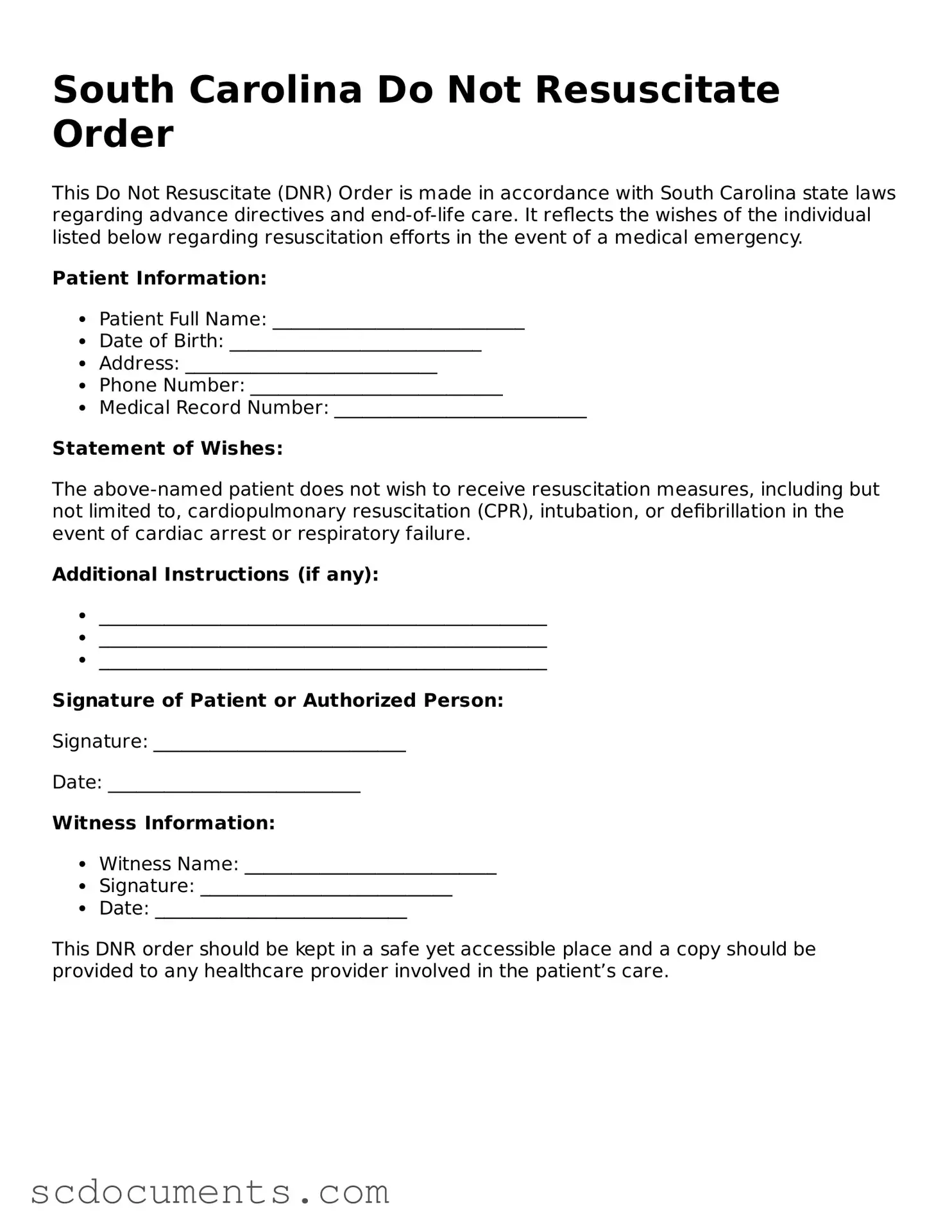Legal South Carolina Do Not Resuscitate Order Form
Dos and Don'ts
When filling out the South Carolina Do Not Resuscitate Order form, it's important to follow certain guidelines. Here’s a list of what to do and what to avoid:
- Do ensure you understand the implications of a Do Not Resuscitate (DNR) order.
- Do discuss your wishes with your healthcare provider and family members.
- Do fill out the form completely and accurately.
- Do sign and date the form to make it valid.
- Do keep copies of the signed form for your medical records.
- Don't leave any sections of the form blank.
- Don't assume that verbal instructions are sufficient; written documentation is necessary.
- Don't forget to review the form periodically to ensure it still reflects your wishes.
- Don't ignore state-specific requirements that may apply to the DNR order.
File Data
| Fact Name | Details |
|---|---|
| Purpose | The South Carolina Do Not Resuscitate (DNR) Order form allows individuals to refuse resuscitation in the event of cardiac or respiratory arrest. |
| Governing Law | This form is governed by the South Carolina Code of Laws, Section 44-66-20, which outlines the legal framework for DNR orders. |
| Eligibility | Any adult who is capable of making their own medical decisions can complete a DNR order. |
| Signature Requirements | The DNR order must be signed by the individual or their legal representative, along with a physician’s signature. |
| Form Availability | The DNR order form is available through healthcare providers, hospitals, and online resources. |
| Revocation | A DNR order can be revoked at any time by the individual or their legal representative, verbally or in writing. |
Documents used along the form
When considering end-of-life care in South Carolina, the Do Not Resuscitate (DNR) Order form is an essential document. However, several other forms and documents can complement the DNR to ensure that a person's healthcare preferences are clearly communicated and respected. Here are some important documents to consider:
- Advance Healthcare Directive: This document allows individuals to outline their healthcare preferences in advance, including specific treatments they wish to receive or refuse. It can also appoint a healthcare proxy to make decisions on their behalf if they are unable to do so.
- Living Will: A living will is a type of advance directive that specifically addresses end-of-life care. It details the types of medical treatments an individual wants or does not want if they become terminally ill or incapacitated.
- Healthcare Power of Attorney: This legal document designates someone to make medical decisions for an individual if they are unable to communicate their wishes. It provides peace of mind knowing that someone trusted will advocate for their healthcare preferences.
- POLST (Physician Orders for Life-Sustaining Treatment): A POLST form translates a patient’s preferences into actionable medical orders. It is typically used for individuals with serious illnesses and is intended to be honored by healthcare providers across different settings.
- Employer’s Return of Income Taxes Withheld (MO-941 form): Essential for employers in Missouri, the MO-941 form captures withholding amounts and necessary updates. For detailed guidance on completing this form, visit All Missouri Forms.
- Do Not Intubate (DNI) Order: Similar to a DNR, a DNI specifically instructs healthcare providers not to place a patient on a ventilator. This is particularly relevant for patients who wish to avoid invasive respiratory support.
- Organ Donation Registration: This document allows individuals to express their wishes regarding organ donation after death. It can be included in a driver's license or registered separately with organ donation organizations.
- Patient Advocate Designation: This document appoints an advocate to help navigate the healthcare system, ensuring that the patient's wishes are understood and respected. This can be particularly useful in complex medical situations.
Each of these documents serves a unique purpose in facilitating clear communication about medical preferences. By utilizing them alongside the DNR Order, individuals can ensure their healthcare wishes are honored and reduce the burden on family members during difficult times.
Key takeaways
When filling out and using the South Carolina Do Not Resuscitate (DNR) Order form, keep these key takeaways in mind:
- Understand the Purpose: The DNR order indicates that you do not want resuscitation efforts in case of cardiac or respiratory arrest.
- Eligibility: This form is intended for adults with a terminal illness or a condition that significantly limits their quality of life.
- Consult a Physician: Discuss your wishes with a healthcare provider. Their guidance is essential for completing the form accurately.
- Complete the Form: Fill out the DNR order completely, ensuring all required sections are addressed.
- Signature Requirement: The form must be signed by you or your legal representative and your physician.
- Keep Copies: Make multiple copies of the signed DNR order. Share them with your healthcare providers and keep one for your records.
- Notify Family: Inform family members and caregivers about your DNR order to ensure your wishes are respected.
- Review Regularly: Revisit your DNR order periodically. Changes in your health or personal wishes may require updates.
- Legal Standing: The DNR order is legally recognized in South Carolina. Ensure it meets state requirements to be valid.
- Emergency Services: Provide a copy to emergency medical services (EMS) personnel to ensure they are aware of your wishes.
By following these key points, you can ensure that your DNR order accurately reflects your healthcare preferences.
Other South Carolina Templates
Hold Harmless and Indemnity Agreement - A Hold Harmless Agreement provides peace of mind for both parties during engagements.
If you are looking for guidance on how to create a thorough Hold Harmless Agreement template, this resource provides all the necessary information to assist you in the process.
Are Non Competes Enforceable in South Carolina - The agreement strengthens the employer's position when hiring new recruits.
